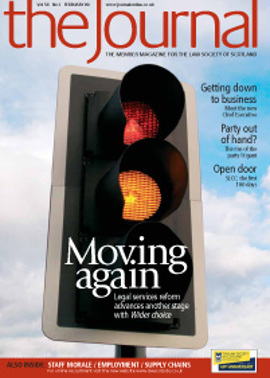Employment: without prejudice

The disclosure of an old membership list of the British National Party in November 2008 created a significant amount of media furore, not only because of its disclosure and the privacy issues which potentially arose but for the details that were publicised. In particular the list appeared to show that the BNP had members in a wide range of professions, including police officers and doctors.
This has led to questions being raised regarding an employer’s right to take action against an employee (or potential employee) who is discovered to be a member of a political party or holding a belief which conflicts with that of the employer. With a growingly diverse workforce, all of whom will have private lives outwith work, questions of personal belief are likely to become an issue which employment lawyers will increasingly be asked to address.
Private lives
Dealing first with the general position of activities carried on outwith the workplace, it is accepted law that such conduct can be relevant to a person’s employment. The recent case of Pay v United Kingdom ECHR 32792/05 further confirmed the position.
Mr Pay, a probation officer, was also a director of a company which was involved in the manufacture and supply of bondage products and also organised certain related events and performances. Pictures of him wearing some of the products and being involved in various dominatory acts with submissive female participants were publicised. His employer felt that such publicised involvement was incompatible with his role as a probation officer and could undermine the probation service and the perceived integrity of its employees. Mr Pay challenged his dismissal and the European Court of Human Rights held that, while his right to privacy and freedom of expression had been interfered with, the steps taken were justified. His case was dismissed.
The position becomes more complicated if the external activity is alleged to be grounded upon some “belief”. The law is somewhat complex in such circumstances and is significantly shaped by Europe. The most recent relevant alteration, which related to the rights of trade unions to expel members, only received Royal Assent in November 2008 and is still to be brought into force (see below). It is however worthwhile examining the case law relating to the issue and the wider principles which apply.
Given the narrow scope of the grounds for a fair dismissal, an employer’s rights are limited. The burden of proof remains on the employer to establish that any dismissal was for a fair reason.
Solicitors must be aware of the additional protections afforded to employees with relevant “religious or philosophical beliefs”, in terms of the Employment Equality (Religion or Belief) Regulations 2003. Such protections, coming within the ambit of discrimination, have the added benefit that the usual requirement for the employee to have one year’s continuous service before they can argue unfair dismissal does not exist. The rights apply equally to applicants for jobs as to existing employees.
Public activities
There are a number of tribunal cases concerning a situation in which an employee has been dismissed for something they did outwith the workplace. There have also been several cases centring around BNP membership.
Redfearn v Serco Ltd t/a West Yorkshire Transport Service [2006] EWCA Civ 659 concerned a claim where a bus driver was dismissed having stood in a local election as a BNP candidate. He was subsequently dismissed because his employer felt that his public involvement with the BNP meant there was a health and safety risk to the users of its service, employees and to the driver himself. Mr Redfearn’s claim that he had been discriminated on racial grounds was unsuccessful. The court held that his case was based on an allegation of discrimination on political grounds and this area was not covered by the anti-discrimination legislation in force at the time. A policy consideration, and in particular the use of race relations legislation in this context, clearly weighed upon the mind of the tribunal.
In Baggs v Fudge ET/1400114/05, a job application was refused due to the claimant’s active BNP membership. Mr Baggs’ attempt to argue that he had been discriminated against failed, as he was unable to persuade the tribunal that membership of the right wing party brought him under the protection of the 2003 Regulations as they existed at the time. This contrasts with Finnon v Asda Stores Ltd ET/2402142/05, where Mr Finnon claimed that he was unfairly dismissed from Asda on the grounds of his membership of and activities with the BNP. The claim survived an initial attempt to have it struck out after he managed to establish that evidence of an ideological belief (promoting “British ethnicity”, views against miscegenation and global capitalism) as the basis for his membership of the BNP existed and therefore the statutory test might be met. He was unsuccessful when his claim came to a full hearing, where the tribunal ruled that he was not protected by the 2003 Regulations as they were framed at the time.
All these cases predated a change in the 2003 Regulations in 2007 which, despite the comments from Government ministers at the time, may mean that a different outcome to such claims is now possible. The majority of previous cases failed because they were unable to establish that a political belief came with the definition of “religious belief or similar philosophical belief”. In April 2007 the word “similar” was removed from the definition. This appears to open the field to arguments that political beliefs (of whatever colour) could now be protected. In the absence of a tribunal decision on the interpretation of the revised legislation, the issue remains unclear. However the hurdle which was potentially overcome in Finnon appears to have been significantly lowered by the change in the law.
In the meantime, certain vocations and organisations have policies prohibiting membership of specific groups including the BNP. These include the police and Prison Service, which justify their rule on the basis that membership of specific organisations is irreconcilable with the job. The UK Border Agency has a similar policy, and the publication of the membership list led to the resignation of one employee and the suspension of another (pending an investigation) due to suspected BNP membership.
In addition, the General Synod of the Church of England has recently been asked to ban all clergy, candidates for ordination and lay persons speaking on behalf of the church from membership of the BNP.
The majority of professions also have their own codes of conduct which would proscribe membership if it would be contrary to the proper performance of the role. The issue is addressed in respect of Scottish solicitors by rule 15 of the schedule to the Standards of Conduct Practice Rules 2008, which prohibits discrimination in professional dealings with clients, employees or other lawyers.
Trade union membership
Membership of a trade union and in particular the rights of that union to exclude or expel members holding views they disagree with, has created its own specific complications. Trade union members cannot be excluded or expelled except in very limited circumstances (set out in s 174 of the Trade Union and Labour Relations (Consolidation) Act 1992). Prior to December 2004, expulsion was not possible if it related to “protected conduct” which included membership or former membership of a political party.
In ASLEF v United Kingdom ECHR 11002/05, ASLEF successfully argued that the UK law which prevented them taking steps against a member who was also a BNP member breached the trade union’s rights under article 11 of the ECHR (freedom of association).
The law was initially altered to provide that expulsion for membership of a political party remained unlawful but expulsion for conduct consisting of activities undertaken by an individual as a member of a political party was not. This meant that a union was permitted to expel or exclude members for their activities, but not solely on the grounds of their membership of a political party.
Following further consultation, additional amendments were introduced in the Employment Act 2008, s 19 (although they are still to be brought into force). The new law permits (in limited circumstances) a trade union to expel or exclude an individual on the basis of their membership or former membership of a political party if such membership is contrary to the rules or objectives of the trade union. The right is not exercisable if the decision to exclude or expel does not comply with the union’s rules, is taken unfairly, or the loss of union membership would cause the individual to lose his livelihood or suffer other exceptional hardship.
Ripe for development
While the release of the BNP list created headlines, employers (and their agents) must remember that employment law still provides significant protection to employees who hold beliefs, even if those beliefs are contrary to those held by their employer or the majority of the population. Those who can argue successfully that the relevant element of their private life comes within the definition of “philosophical belief” will have additional protections. However the extent of this protection and the ambit which it covers is likely to an issue for further debate and case law.
UPDATE
1 May 2009. Graeme Dickson writes:
The prediction in the article that a recent change in the law might extend the protection provided, despite what the UK Government said at the time, has now been borne out by the case of Nicholson v Grainger PLC and others, ET 2203367/08, where a tribunal has held that a claimant's belief regarding climate change was capable of being classed as a "belief" for the purposes of the Employment Equality (Religion or Belief) Regulations 2003. Although the decision may be appealed, it represents the first confirmation that "belief" need not be akin to a "religious belief" for it to come within the law's ambit.
If other tribunals follow this case, or it is affirmed by the EAT, this would represent a significant extension to the law. Practitioners acting for employees and employers should keep this decision in mind when advising their clients where personal beliefs form part of a matter.
In this issue
- Cross-border disputes: new rules
- Beyond the downturn
- Take a business view
- Amber alert
- ARTL - time to reflect
- Jack to the future
- Party time
- Head of steam
- Big names for Society's big date
- Employment: without prejudice
- Simple steps
- Taken on credit
- Positive returns
- Electrical storm on the horizon?
- What's on file?
- Ask Ash
- New cases, old problems
- Fair sharing of less
- Beware - simpler rules
- Shifting sands
- Offer you can't refuse
- Website review
- Book reviews
- Weakest link
- Servitudes - new ground?






